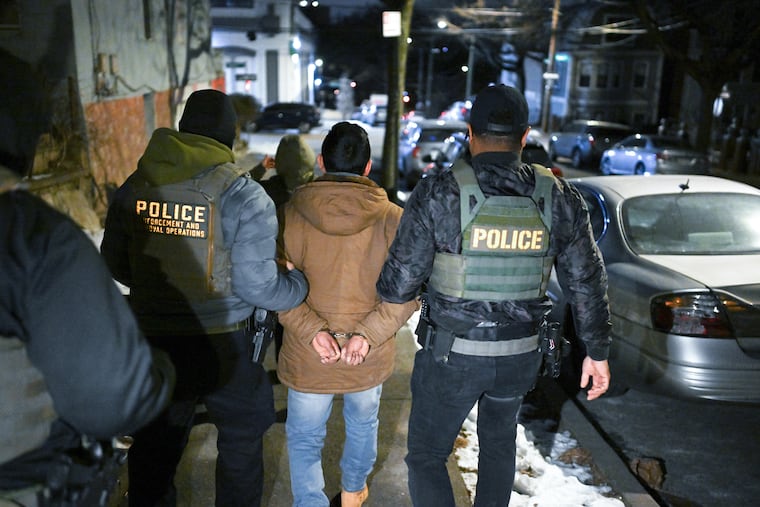The weaknesses of Trump’s migration diplomacy can be seen in his attempts to bully Latin American leaders
While the president thinks his position makes him seem tough, it really just makes him easier to manipulate.

When I was living in Honduras from 2017 to 2019, it was abundantly clear the U.S. Embassy’s priorities were entirely centered on stopping migration.
Whatever else the Honduran government under Juan Orlando Hernández did or did not do was immaterial. Hernández was willing to play ball with the first Trump administration regarding anything it wanted that had to do with migration. He knew it would look the other way on anything else.
In the early days of the Biden administration, Hernández was extradited to the United States for charges related to international drug trafficking.
The Biden administration was also generally concerned about migration in the Americas, enacting a number of policies during its tenure to try and keep people from getting to the U.S.-Mexico border to seek asylum.
Its view was less myopic than its predecessor’s, but also, Hernández was no longer in power in Honduras — whatever the new administration’s policy, he was no longer the guy to get it done. The legacy of his actions, however, endures.
Sitting in the courtroom during Hernández’s trial in New York City in 2024, I got the impression he could not believe he was there.
Not because he had not engaged in those things, but because his ties to narco groups in Honduras were a long-standing open secret in Honduras and among U.S. Embassy-connected personnel.
It just had not mattered before. While cooperating on every one of the Trump administration’s anti-migration agenda items, Hernández also planned to “shove the drugs right up the noses of the gringos.”
With the president’s return to the White House, migration diplomacy has taken a new turn.
President Donald Trump wages war with threats of tariffs and canceled visas to bully leaders all throughout Latin America into accepting his terms regarding deportations.
He thinks it makes him look strong; he thinks the message is that there’s a new sheriff in town, and we won’t be having any of this sending your huddled masses to the United States any longer.
The joke’s on him. What the experience of Hernández shows us is that Trump’s anti-immigrant fervor makes him transparent.
While Trump believes he’s the one wielding the stick, it actually means his counterparts know exactly just what kind of carrot is his favorite.
Nicolás Maduro in Venezuela is the first, clearest example. After a blatantly fraudulent election in 2024 and deepening violent repression of the opposition, Trump sent a special envoy to Venezuela, and Maduro agreed to take deportees.
In return, despite sanctions, Chevron can continue its operations in Venezuela, guaranteeing an important economic foundation for Maduro.
On the other end of the spectrum, the democratically elected yet precarious government of Bernardo Arévalo in Guatemala has long known that support from the United States is ensuring its stability, staving off the encroachment and any potential coups from a corrupt elite used to governing as they please.
When Secretary of State Marco Rubio came away from Guatemala with an agreement to accept deportees from other countries, Trump claimed victory.
Not much has been reported as to what Guatemala asked for in return, but Arévalo could be sure it was his best bargaining chip to secure continued support for his administration with Trump in the White House.
While Trump believes he’s the one wielding the stick, it actually means his counterparts just know exactly what kind of carrot is his favorite.
This is not the first time in U.S.-Latin American relations that the American agenda has been so abundantly hyper-focused.
Not long in our past, there was a time when anti-communism was all the White House cared about, leading us to support brutal wars and bloody dictators, as long as they were anti-communist bloody dictators.
The U.S. helped orchestrate the coups against democratically elected leaders like Jacobo Árbenz in Guatemala and Salvador Allende in Chile, ushering in military rule — in the name of “democracy.”
Let us never forget that we secretly and illegally sold weapons to Iran in order to secretly and illegally fund anti-communist fighting forces in Central America.
This moment will have long-term consequences. Just like it did when tens of thousands of people were displaced from Central America in the 1980s while the U.S. supported the fight for democracy there in the form of genocidal (but anti-communist!) governments.
Just like it did when Hernández facilitated the consolidation of narco empires and shoved cocaine up our noses.
This moment will come back in the form of harm for the United States. More unrest, which contributes to more migration, is a predictable result. Other things the United States claims to care about will also get ignored, including corruption, democratic backsliding, and drug trafficking (just to name a few).
It’s bad long-term geopolitics.
But the most important consequence is the incredible, devastating cost to human lives.
We are saturated with stories of deportees who have been murdered after being sent back to their home countries from the United States; at least three of the young men whom I knew during my fieldwork were murdered after being sent back to Central America.
There are too many stories like this — but there’s also the slow, grinding violence caused when people are sent back to conditions that subject them to constant fear, gnawing hunger, crippling debt, and broken dreams.
Amelia Frank-Vitale is an assistant professor in anthropology and international affairs at Princeton University. Since 2010, her research has focused on transit migration and deportation in Mexico and Central America.